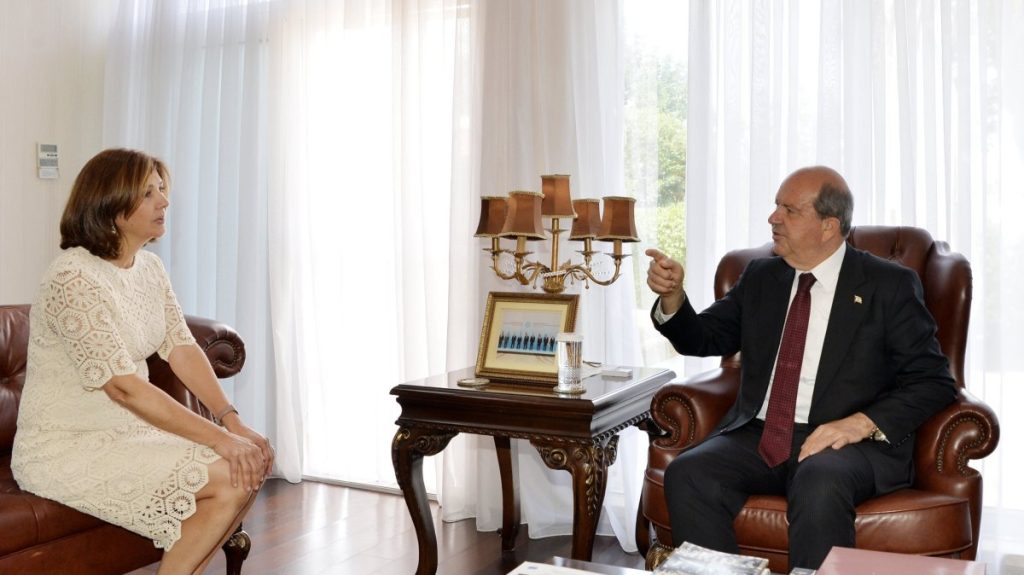The U.N. Secretary-General Antonio Guterres has reappointed Maria Angela Holguin Cuellar of Colombia as his personal envoy on Cyprus, the world body announced Friday.
Holguin, a former Colombian foreign minister, previously held the same role from January to July 2024.
Following an informal meeting on the Cyprus issue held in Geneva in March, Guterres requested Holguin to reengage with the parties and advise him on the way forward, according to a U.N. statement.
“Ms. Holguin brings extensive diplomatic experience at the highest levels, including as Minister of Foreign Affairs of Colombia (2010-2018),” the statement said.
Holguin has held several senior diplomatic positions, including Colombia’s permanent representative to the U.N., ambassador to Venezuela, and deputy foreign minister.
Decades-long Cyprus problem
Cyprus has been mired in a decades-long dispute between Greek Cypriots and Turkish Cypriots despite a series of diplomatic efforts by the U.N. to achieve a comprehensive settlement.
Ethnic attacks starting in the early 1960s forced Turkish Cypriots to withdraw into enclaves for their safety.
In 1974, a Greek Cypriot coup aimed at Greece’s annexation of the island led to Türkiye’s military intervention as a guarantor power to protect Turkish Cypriots from persecution and violence. As a result, the TRNC was founded in 1983.
It has seen an on-and-off peace process in recent years, including a failed 2017 initiative in Switzerland under the auspices of guarantor countries Türkiye, Greece, and the UK.
The Greek Cypriot administration entered the EU in 2004, the same year that Greek Cypriots single-handedly blocked a U.N. plan to end the longstanding dispute.
Turning point
The Geneva meeting in March marked a watershed moment in the decades-long Cyprus issue, as the concept of a federal solution was not even mentioned for the first time, according to Türkiye’s diplomatic sources.
This shift signals that a new phase has begun in efforts to resolve the island’s 60-year division, according to the Turkish Foreign Ministry sources.
The sources said the Turkish Republic of Northern Cyprus (TRNC), led by President Ersin Tatar, declared during the April 2021 informal 5+UN talks in Geneva that it no longer supports the long-standing idea of a bi-zonal, bi-communal federation.
Instead, the Turkish Cypriot side proposed a new path: a two-state solution, the sources added.
This proposal, fully supported by Türkiye, contends that decades of talks based on a federal model have failed and that the reality on the island is now clear-there are two distinct communities and administrations.
For any new negotiations to begin, Türkiye and the TRNC insist that the Turkish Cypriots’ fundamental rights — sovereign equality and equal international status — must be recognized.
At the end of her term in July, Cuellar submitted a report to the U.N., but its contents were not made public.
Later, an expanded informal meeting, agreed upon during a dinner in New York, was held in Geneva on March 17-18 this year.
It brought together both Cypriot leaders, their foreign ministers, and the UK minister of state.
Notably, the federal solution was left out of the discussions altogether.
With no common ground for a comprehensive solution, the meeting instead focused on practical cooperation between the two sides.
Talks explored ways to improve daily life on the island, including opening more crossing points, clearing landmines, addressing climate and environmental issues, producing solar energy in the Buffer Zone, restoring cemeteries, and launching a youth-focused technical committee.
Türkiye’s unwavering Cyprus stance
The parties also agreed on a timeline for the coming months, including a second informal meeting at the end of July.
Until then, they will assess progress in the agreed-upon areas and consider appointing a new U.N. envoy.
According to diplomatic sources, this new direction stems from Türkiye’s consistent policy toward Cyprus.
Ankara blames the ongoing stalemate on the Greek Cypriot side’s refusal to share political and economic power with the Turkish Cypriots.
Türkiye maintains that recognizing the reality of two peoples and two states on the island is key to moving forward.
It has welcomed the U.N.’s more realistic approach and called on third parties-particularly the EU-to stop backing the Greek Cypriots “under the banner of union solidarity” and instead support the secretary-general’s efforts to foster cooperation on the ground.


